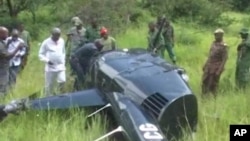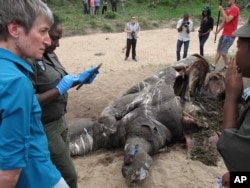A helicopter pilot died while chasing elephant poachers in Tanzania late last month.
British pilot Roger Gower, 37, was working for the Friedkin Conservation Fund and the Tanzanian government. He was trying to prevent elephant poachers from escaping the Maswa Game Reserve near Serengeti National Park.
The men opened fire on his helicopter with AK-47 rifles.
Gower was able to land his helicopter, but died before he could be rescued. The Guardian newspaper said five suspects in Tanzania have been arrested in the shooting.
The British publication Daily Mail reported that Gower may have been shot down “by poachers who sell illegal ivory to fund terrorism.” It said that sales in elephant tusks supplies money “used to fund Islamic extremist groups such as Al Qaeda-affiliate Al Shabaab.”
Also in late January, U.S. Interior Secretary Sally Jewell visited South Africa to see for herself the terrible practice of poaching. Jewell stood by a dead white rhino killed by poachers in South Africa, and called it a “sad scene.”
“And it’s a scene that is frustrating as I think that South Africa has done such a good job in bringing the white rhino back from the brink of extinction. So to see a white rhino in this condition, it’s difficult.”
She called on nations around the world to work together to stop wildlife trafficking.
At the Kruger National Park, she saw a male white rhino that had been shot and killed by poachers. They removed its horn and left behind the rest of the body for vultures to eat. A park team took DNA samples and other evidence from the rhino. They hope it can convict the poachers once they are found.
Edna Molewa is South Africa’s Minister of Water and Environment. She said, “giving up is not an option. We have to fight this battle and we have to win.”
Jewell called on the world to stand up and fight wildlife trafficking in all its forms.
“We need the world to see this kind of thing so that they actually take action and also recognize that the only value of rhino horn is on a live animal, otherwise it is valueless.”
South Africa has 22,000 white rhino, the world’s largest population. Nearly half live in the Kruger National Park.
But poachers keep hunting them, and killing them for their horns. Most of the horns are sold on the international black market, particularly in Asian countries like China and Vietnam. Customers buy the powdered horn, thinking it has the power to heal or make a man more virile.
Science has proven that rhino horns have no magic powers and are made of the same things as fingernails.
Last year, poachers killed more than 1,000 rhinos.
Now the country uses both ground and air rangers to protect the rhinos. The also watch over hundreds of other wildlife animals from armed poachers. The rangers say they are a very dedicated group. They say they are protecting the animals because they belong to everybody.
As one ranger said, “It’s not only for us Africans, but for the whole world.”
The African elephant, African lion, cheetah and the black and the white rhino all have one thing in common. They are all on South Africa’s endangered species list.
Jewell said she has a “mouthful” to report to President (Barack) Obama.
And, the secretary warned that “these animals, particularly the black rhinos, are at risk of going extinct if we don’t act and we don’t act quickly.”
I’m Anne Ball.
Thuso Khumalo and Adam Shaw reported on this story for VOANews.com. Anne Ball adapted their reports for Learning English. Kathleen Struck was the editor.
What do you think can be done to protect these animals? We want to hear from you. Write to us in the Comments Section and on our Facebook page.
________________________________________________________________
Words in This Story
poacher – n. a person who hunts animals illegally
trafficking – n. organized criminal activity of buying and selling illegal items
vulture – n. a kind of bird that eats dead animals
brink – n. on the edge
extinction – n. the act of making something extinct, or disappear forever
black market – n. a system of buying and selling things illegally
virile – adj. having qualities considered attractive in men like strength and sexual energy






